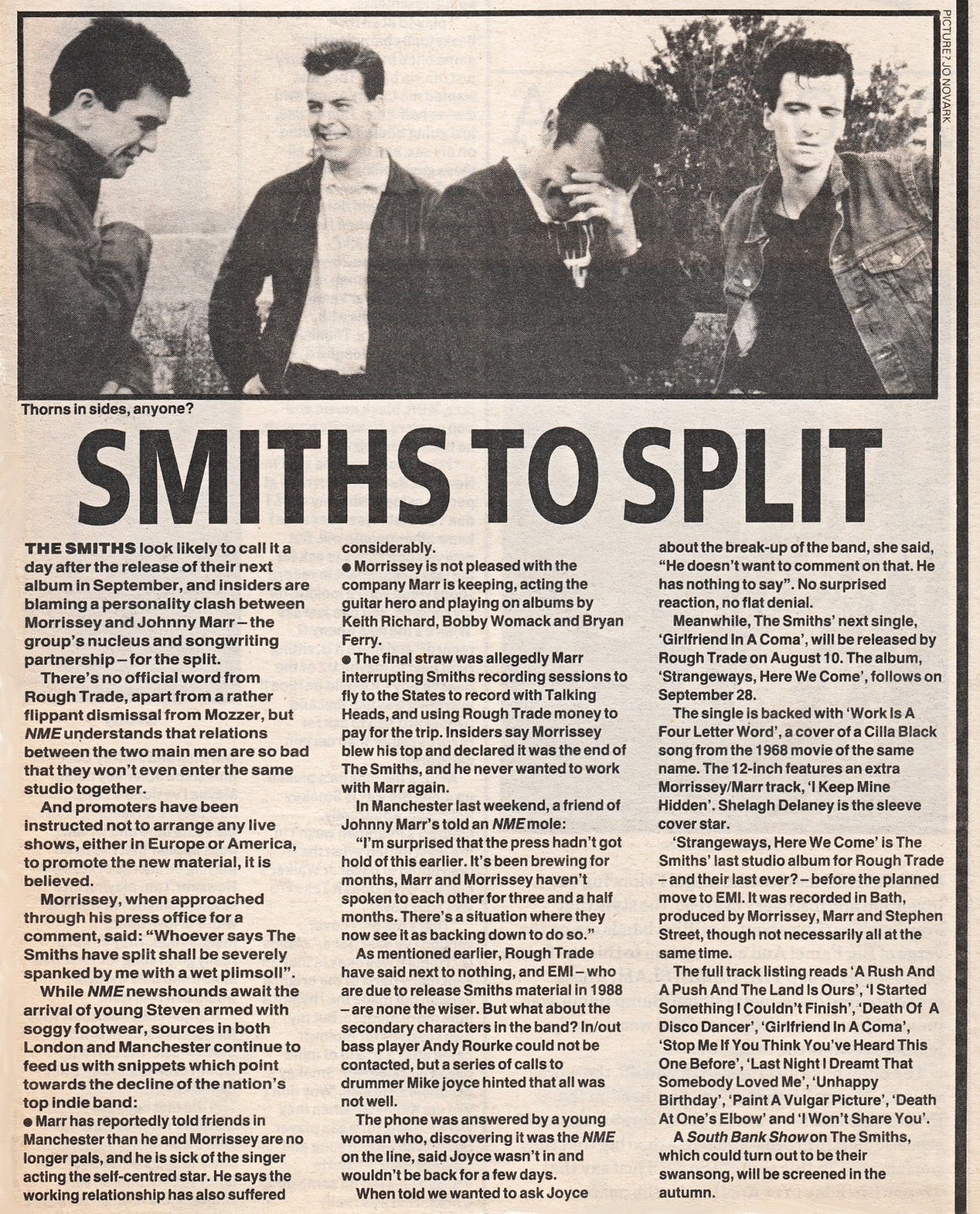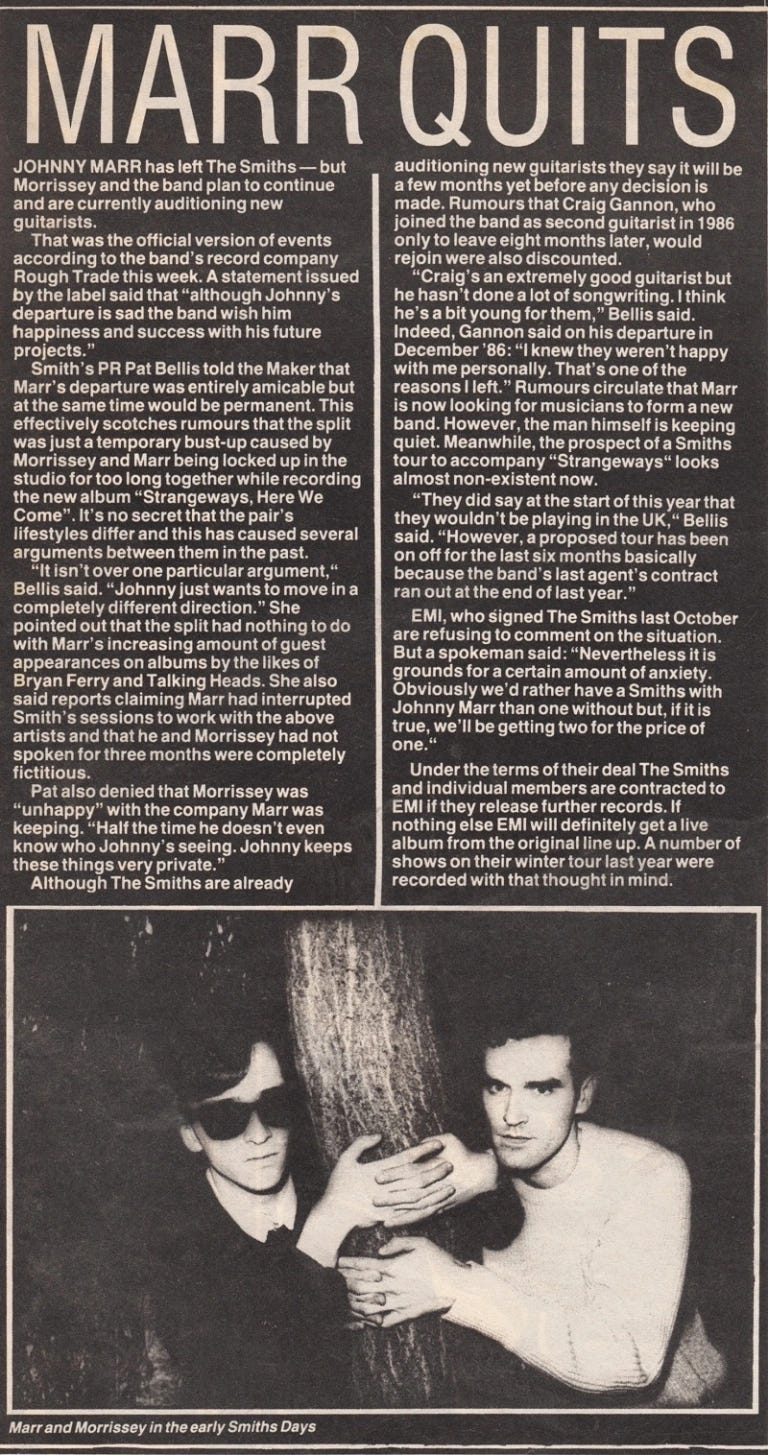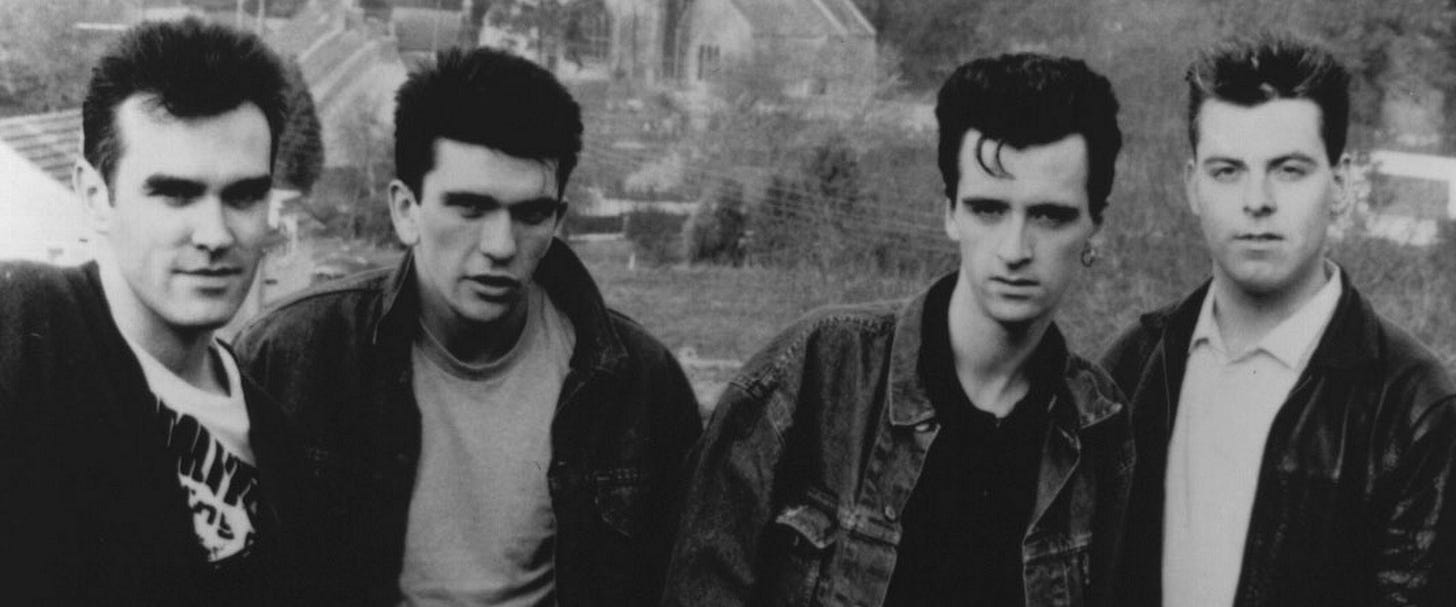"'Work Is a Four Letter Word' I hated. That was the last straw, really. I didn't form a group to perform Cilla Black songs. That was it, really. I made a decision that I was going to get away on holiday. The only place I could think of was L.A. […] the only place I knew where there'd be sunshine, so off I went. I never saw Morrissey again."1
Notwithstanding statements to the effect that the recording of an obscure Cilla Black song precipitated the dissolution of the Morrissey-Marr partnership, the demise of the Smiths was due to a set of circumstances that steadily evolved over the relatively short time the Smiths were in existence, the impact of which being exacerbated by poor communication (despite the robust efforts of Johnny Marr) and more than a little bit of indifference, whether real or perceived.
The concerns of Johnny Marr, as he revealed to his bandmates at Geales restaurant in Notting Hill one day in early May of 1987, were painfully real and would not be assuaged by way of yet another recording session.
True to himself, Morrissey was incapable of addressing Marr’s disapprobation with the state of the group and his role in it. A complex personality, Morrissey seems to be particularly adverse to confrontation. In Autobiography we find a litany of personal and professional wrongs, all carefully curated in its 457 pages. Absent is any mention of overt effort to address any of them. What emerges is a portrait of an individual who is captive to unfolding events around him, despite being keenly aware of what is happening. In a curious way, it is as though Morrissey, while long suffering the affronts, tribulations, and disappointments of life, prefers the role of observer (as a great deal of his lyrics have shown over the decades) over action.
This assessment of the man is not criticism per se, but rather an honest take on an individual possessing profound awareness and insight, as well as a unique ability to utilize them in a manner that has brought him artistic success. But if one was to critique Morrissey, it would be sheer negligence to fail to point out that the man does not possess the ability to compromise, while at the same time displaying a highly refined propensity for passive-aggressiveness .
Given the vagaries of life, a dose of pragmatism from time-to-time can be a beneficial tonic. The ultimate fate of the Smiths attests to this, especially when one considers that Marr’s departure for a sorely-needed holiday was, at least initially, only a temporary absence.
Come August 1, 1987, a purely speculative article appeared in the NME that was to prove pivotal. Titled ‘Smiths To Split’, the article quickly set things in motion as many, most especially Marr, perceived it as being steeped in fact.
In Autobiography, Morrissey writes of this time elliptically:
“…suddenly the press is rife with Smiths split stories. To obviate doubt, we hold off with communications, and I sit, watching the situation as if behind glass […] These, we are all assured, are the facts […] The rumor is more important than the truth, and as soon as the rumor is half-uttered it gains strength.”
What is so conspicuous in all of this is Morrissey’s reticence with respect to setting the record straight in real time, whether by way of speaking to the music press to clarify the matter, or simply by telephoning Marr to dispel the swirling rumors. Instead, Morrissey describes himself in manner that makes him an unwitting victim of sorts (“watching the situation as if behind glass”). Morrissey’s apparent paralysis is inexplicable - unless it was by design. It has been said that Marr suspected that the initial NME article was a “plant” by Morrissey to facilitate the dissolution of the Smiths. Perhaps Marr was on to something.
Marr waited for Morrissey to contact him in the wake of the NME article. As acknowledged by the latter, no call was made. To be fair to Morrissey, Marr likewise made no effort whatsoever to contact him (or any of his bandmates, for that matter). One imagines that if pride and stubbornness were currency, that Mssrs. Morrissey and Marr would be wealthy beyond measure.
A little over a week after the publication of the split article, Marr contacted the NME to tell them he had indeed quit the band (presumably his haste the result of wanting to beat Morrissey to the punch). An official press release from Rough Trade confirmed Marr’s departure.
It would not be until October of 1987 that Morrissey finally acknowledged that the Smiths had effectively dissolved as a group, telling Les Inrockuptibles magazine:
“I think all members of the Smiths have reached the point where they really have to do something different now. Whether that’s forever, I don’t know. I mean, I never believed that the Smiths should end. So, maybe it won’t be forever, maybe it will, but at this stage, and I think this quite common with many groups…they reach a certain point where they have to try something different with somebody different.”
For his part, Marr has since scoffed at the notion that the demise of the Smiths was the result of a misunderstanding stemming from the NME article:
“You’d really need to have an entire book that was just dedicated to the breakup of the band […] I mean the miscommunication is just one facet of it, though, isn’t it? You know, the band wouldn’t break up just because of miscommunication. It has to be, you know, the end, you know? ..I wouldn’t have left my own band that I formed and put my life into just because of a misunderstanding, you know? It was untenable. And I felt like I was left no choice, and that’s fine. That’s absolutely alright, and yes, it was very sad, but it was meant to be […] The differences in personalities are what often make for interesting chemistry, and inevitably the differences in personality comes a point when those things are gonna stop forward motion, I guess. I suppose as well, me and Morrissey just saw our futures differently.”2
In an interview with The Guardian in 2016, Marr stated that band's split mostly stemmed from the lack of professional management, which caused financial and business strains that otherwise could have been avoided (a view that has more or less been confirmed by Morrissey). Instead, the task of managing the group fell mostly upon Marr. “It’s what split the band up. To this day, I haven’t met anyone who thinks a major rock group should be managed by the 23-year-old guitar player, […] We were deemed unmanageable. When we fired managers, I always had to deal with it. I wasn’t prepared to do it, and so it became untenable. There was no way forward.”
“The Smiths broke down because of strain. I think Johnny simply had enough of the intensified pressure and wanted to play music.… He just really wanted to play music and get on with it. That’s why the Smiths ended.” -Morrissey
The dissolution of the Smiths, as painful as it is, was perhaps inevitable. That it has proven to be permanent is regrettable. The almost indefinable magic of the Morrissey-Marr partnership produced a body of work that have more than weathered the test of time. Indeed, the passage of nearly four decades since that unfortunate summer of 1987 has shown that the Smiths’ oeuvre possesses the imprimatur of iconic works of art that will long outlive those who created it. In a sense, Morrissey and Marr, along with Rourke and Joyce, have attained a sort of immortality.
Rogan, Johnny, Record Collector (December 1992)
Hiatt, Brian, Rolling Stone (October 27, 2018)




